
Poisonous Spiders of North Carolina
Spiders are a common problem for homeowners in North Carolina. We have tons of spiders here in our area and those spiders love to establish themselves in and around our homes. But which ones are the poisonous spiders of North Carolina?
Spiders can be beneficial, so at A-1 Pest Control, we're slow to take webs down if they're in a hard-to-reach location. But there are two spiders in North Carolina that we don't put up with at all, and rightly so. These poisonous spiders of North Carolina are the brown recluse spider and the black widow spider.
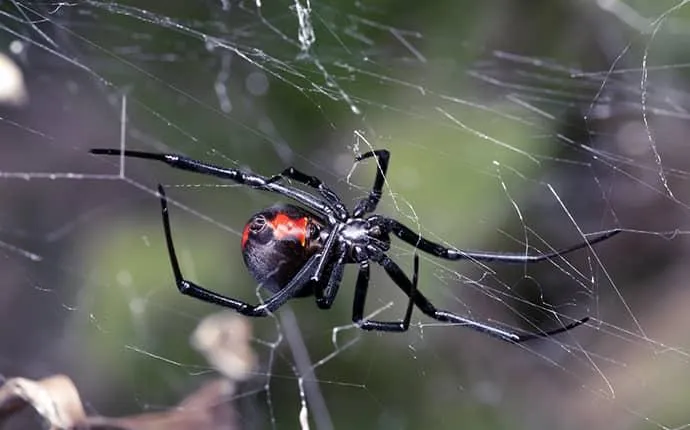
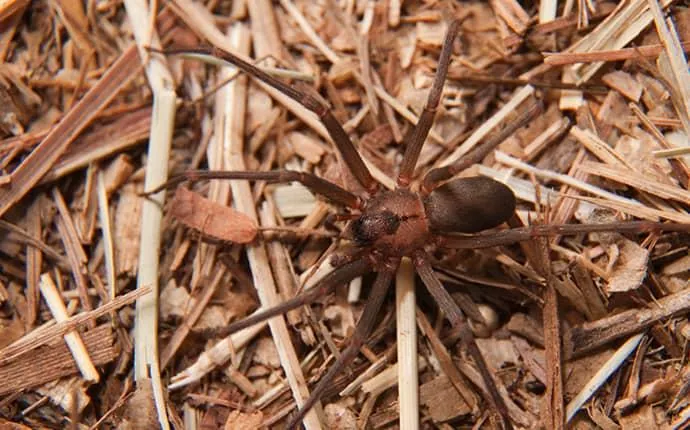
Table of Contents
Types of Poisonous Spiders of North Carolina
North Carolina is home to a few venomous spider species, although they are generally not aggressive and rarely pose a significant threat to humans. However, if you do notice any of these poisonous spiders, call our exterminators.
Here are some of the notable poisonous spiders of North Carolina:
- Black Widow Spider (Latrodectus mactans): The black widow is one of the most notorious venomous spiders in North Carolina. Females are shiny black with a distinctive red hourglass-shaped marking on their abdomen. The venom of the black widow contains neurotoxins that can cause severe pain, muscle cramps, and other symptoms, although fatalities are extremely rare.
- Brown Widow Spider (Latrodectus geometricus): The brown widow is a close relative of the black widow and can also be found in North Carolina. It has a brownish body with an orange hourglass pattern on its abdomen. While its venom is similar to that of the black widow, its bites are generally less severe and less frequent.
- Southern House Spider (Kukulcania hibernalis): Although not aggressive, the southern house spider is occasionally mistaken for a brown recluse due to its appearance. It is dark brown and has long legs. However, its venom is not medically significant, and it is considered harmless to humans.
- Wolf Spider (Lycosidae family): Wolf spiders are common in North Carolina and are usually large, brown, and hairy. They are not known for being aggressive, but their bites can be painful. While their venom is not dangerous to humans, some people may experience local swelling and discomfort.
- Carolina Wolf Spider (Hogna carolinensis): This large and robust wolf spider is native to the region and can be found in North Carolina. While they may appear intimidating, their bites are not considered medically significant to humans.
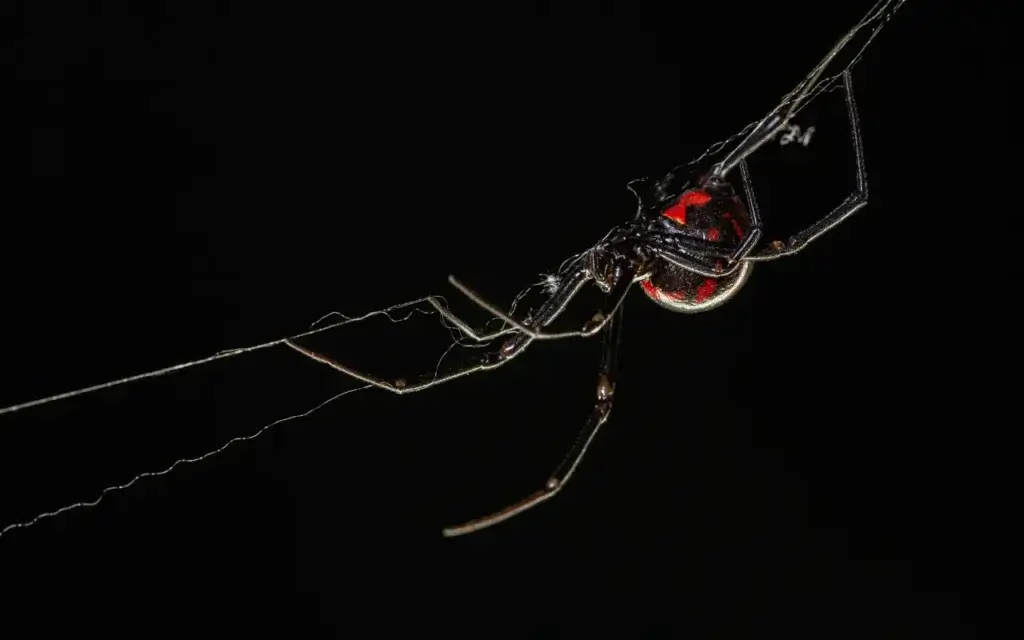
The Two Most Dangerous Spiders in North Carolina
North Carolina is home to two of the most dangerous spider species in the southeastern United States: the black widow and the brown recluse.
It's important to emphasize that both these spider species are typically non-aggressive and only bite when they feel threatened or cornered. Most people who are bitten by these spiders do not experience severe symptoms, but it's advisable to exercise caution, especially in areas where these spiders are known to be present. If bitten and experiencing concerning symptoms, seeking medical care is essential to ensure appropriate treatment and wound management.
1. Brown Recluse Spiders
The brown recluse spider, known as Loxosceles Reclusa, is less common in North Carolina. They have a distinctive violin-shaped marking on their cephalothorax.
Brown recluse venom contains cytotoxins that can lead to necrotic skin tissue, causing a slow-healing, ulcerous wound at the site of the bite. Systemic symptoms such as fever and chills can also occur. Like black widows, fatalities from brown recluse bites are exceedingly rare, but medical attention is crucial for proper wound care and to prevent secondary infections.
Symptoms of a Brown Recluse Spider Bite:
- Mild Stinging or Burning: Brown recluse spider bites are often initially painless or cause only mild stinging or burning at the bite site.
- Redness and Swelling: Within several hours to a day or so after being bitten, the bite area may develop redness and swelling. The center of the bite may become paler or form a central blister.
- Pain and Itching: As the bite progresses, pain and itching can become more pronounced. The pain may become severe, and it can radiate from the bite site.
- Fever and Chills: Some individuals may experience mild fever and chills in response to the bite.
- Necrotic Skin Tissue: In some cases, the bite may progress to necrotic (dead) skin tissue, leading to the formation of an open ulcer or sore. This can take days or even weeks to develop and may require medical attention.
- Systemic Symptoms: Although rare, brown recluse bites can lead to systemic symptoms, including nausea, vomiting, muscle pain, and joint pain.
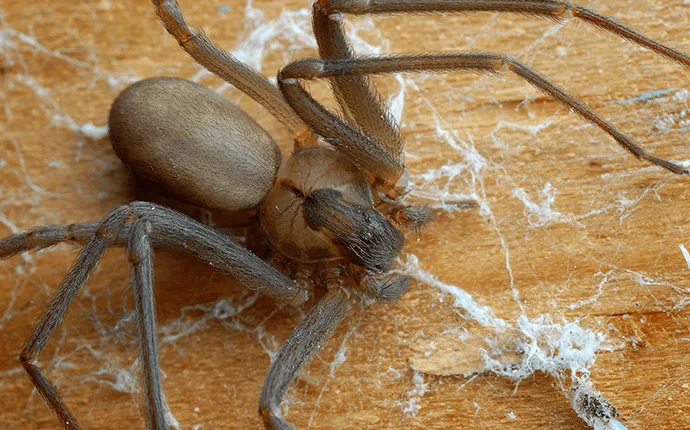
2. Black Widow Spiders
Black widow spiders, known as Latrodectus Mactans, are known for their shiny black appearance with a distinctive red hourglass-shaped marking on the underside of the abdomen.
Their venom contains neurotoxins that can cause severe pain, muscle cramps, fever, and in rare cases, more systemic symptoms. While fatalities from black widow bites are extremely rare, their venom can be particularly dangerous for the very young, elderly, or those with compromised immune systems. Prompt medical attention is advisable if bitten by a black widow, as antivenom may be administered in severe cases.
Symptoms of a Black Widow Spider Bite:
- Immediate Pain: Black widow spider bites are often initially painful and may feel like a sharp pinprick or burning sensation at the bite site.
- Redness and Swelling: The bite area may become red, swollen, and tender within a few hours of being bitten.
- Muscle Cramps and Pain: Muscle cramps and severe pain, especially in the abdomen or back, are common symptoms. These pains can be intense and may last for several hours to a few days.
- Sweating: Profuse sweating, particularly around the bite area, is a characteristic symptom of black widow envenomation.
- Chills and Fever: Some individuals may experience chills and a mild fever.
- Nausea and Vomiting: Nausea and vomiting can occur in some cases, though they are less common symptoms.
- Headache: A persistent headache is another possible symptom of a black widow bite.
- Muscle Weakness: In severe cases, muscle weakness and tremors may occur, though this is relatively rare.
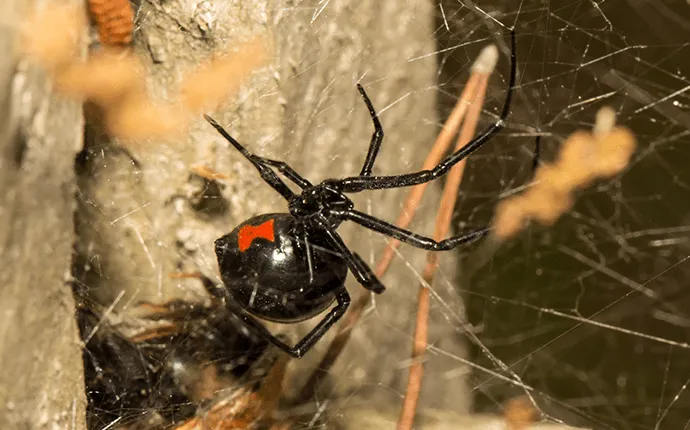
What to Do if You Get Bit by a Spider
If you suspect that you've been bitten by a poisonous spider, it's important to take prompt action.
It's crucial to seek immediate medical attention, especially if you believe the spider may be venomous, like a black widow or brown recluse. Provide as much information as possible about the spider's appearance and where the bite occurred, as this can aid in diagnosis and treatment. Do not attempt to cut, squeeze, or suck out venom from the wound, as this can worsen the situation. Spider bites, even from venomous species, are rarely fatal, but a medical evaluation is essential for proper wound care and, if necessary, the administration of antivenom or other treatments.
After seeking medical attention, it's important to keep the wound clean. Here's what to do if you get bitten by a spider:
- Wash the affected area with soap and water to reduce the risk of infection.
- Apply a clean, cold compress to the bite to help reduce swelling and alleviate pain.
- Keep the bitten limb elevated to minimize swelling as well.
- Note any swelling or track running from the bite towards your heart. If there are discolored trails running towards your heart, you need to take action immediately. Go to the emergency room or contact your local poison control center for instructions.
Spider Bite Prevention
Now that you can identify the two main poisonous spiders of North Carolina, it's important to learn how to prevent getting bit.
If you're seeing either of these spiders in or around your home, here are a few tips for preventing a bite:
- Be cautious when opening boxes that have been in storage.
- Shake out shoes, clothing, towels, and other items before you wear them or use them in case one of these spiders is hiding inside.
- Check your bedding for spiders before climbing into bed; the last thing you need is to trap one of these spiders between your sheets and your skin.
- Remove brush from your yard to eliminate hiding spots for these spiders.
- Wear gloves when working in your yard to avoid inadvertently making contact with one of these spiders and being bitten.
- Be cautious and use a flashlight when going into a crawlspace or when crawling under a deck, patio, or porch.
Final Word: Poisonous Spiders of North Carolina
For assistance dealing with common house spiders or venomous spiders, reach out to us at A-1 Pest Control. When it comes to solving pest problems, we are a proven leader in the pest control industry. If you are dealing with a pest problem, draw upon our over 50 years of experience to keep dangerous and destructive pests out of your North Carolina home. We are here to help!
